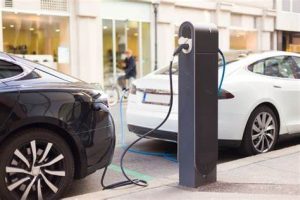Home Charging a Company Vehicle

Despite financial incentives, electric vehicles (EVs) are still more likely to be owned by business users and those who are more affluent. Nevertheless, more and more all-electric and hybrid cars can now be spotted on motor trade forecourts, So, the ‘trickledown effect’ will surely create opportunities for a broader range of motorists to purchase electric new and used vehicles.
A new kind of car means the motor trade industry must invest in new equipment and training. Likewise, motor trade insurance brokers will have to cover some new risks and modify their insurance policies.
However, for private motorists owning an EV, the greatest change is likely to be getting used to a new method of refuelling.
Of course, refuelling affects business users too, and if you are already an EV company car user you will be aware that home charging a company car is not without its little snags.
Future new-build homes will mostly come with dedicated vehicle charge-points, and retro-fit grants are available to install home-charging facilities in older properties.
Presently, drivers must at least have access to a personal parking space, which in some cases may mean acquiring parking away from your home. Once that is feasible, those with company EVs can look to the Electric Vehicle Homecharge Scheme (EVHS).
This UK government scheme is open to all who have the use of an eligible electric or plug-in hybrid company car for at least six months and applies to rental arrangements and salary sacrifice schemes.
The EVHS funds up to 75% of the cost of purchase and installation of an EV charge-point, subject to a limit of £350. Provided the EV equipment is genuinely for a company car, HMRC does not treat the installation of an EV home charge-point as a ‘Benefit-in-Kind’, so your company could claim the grant, foot the bill for all the costs, and neither you nor your employer would incur any tax burden.
However, you will need to provide the following: a) showing evidence of your home charge costs as an item kept separate from your own domestic energy bill; b) producing a breakdown of your private/business mileage.
HMRC sidesteps the issue by not treating electricity as a fuel in this context, effectively, charging expenses for dual-use business/private vehicles are thus regarded as additional income for tax purposes – requiring employers and employees to produce evidence about how such business/private expenses should be split.
The alternative solution is to adopt HMRC’s own mileage rate scheme. Using this method, business drivers can claim business journeys in electric vehicles at 5p per mile, with plug-in hybrid rates charged according to the power of the petrol or diesel engine fitted.

Where the majority of a journey uses battery power, that should be plenty to meet the cost of the fuel and electricity consumed.
New technology is starting to get to grips with all these issues. Newer charge-points have data connectivity, which means usage data is also available to phones and apps, and some high-tech charge-points are now integrated with business payroll facilities which may allow real-time cost calculations – so charging/refuelling expenses could then be reimbursed through normal monthly salary arrangements.
Nevertheless, even some of today’s state-of-the-art systems cannot readily differentiate between energy usage where the data reflects both business and private vehicle use.






